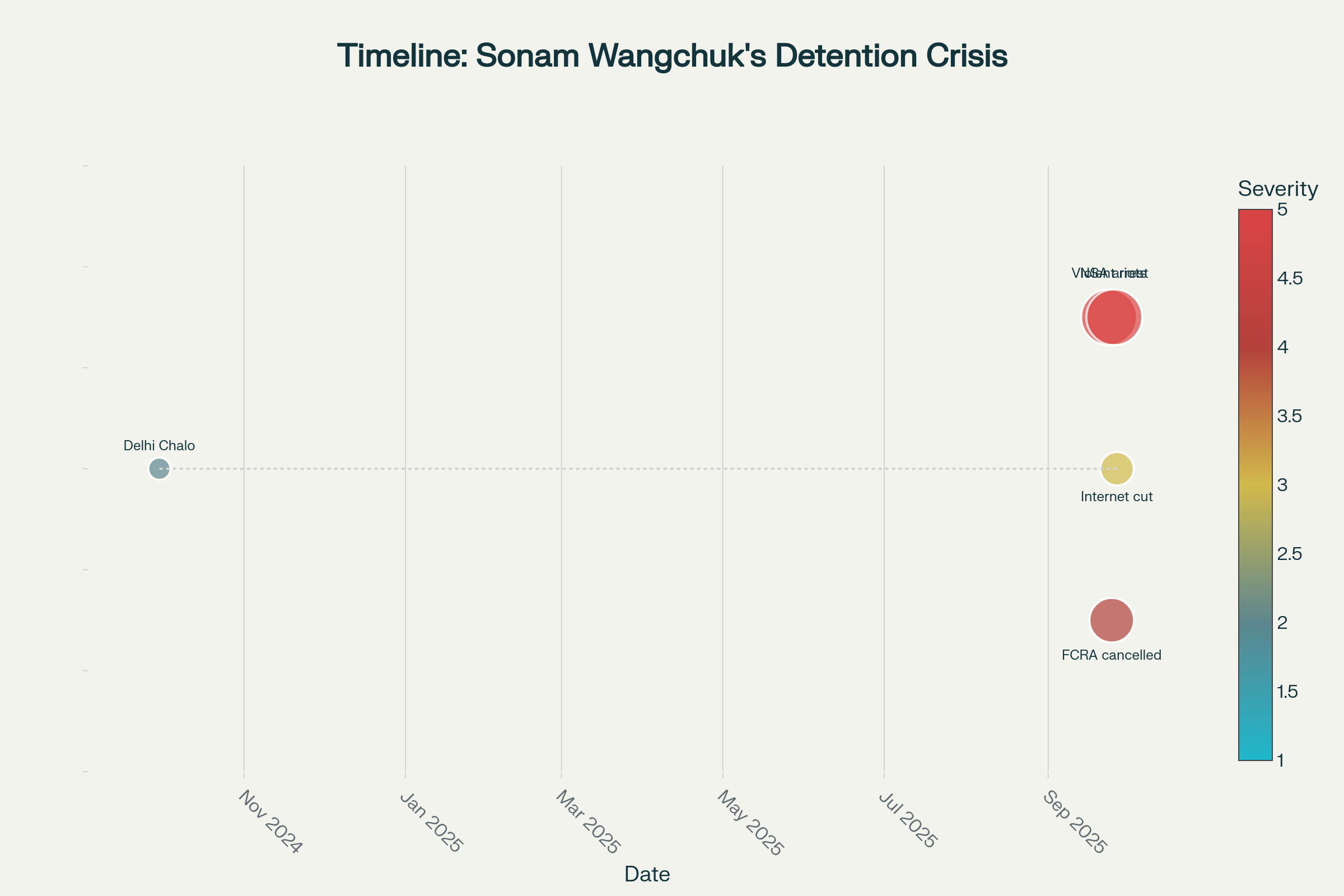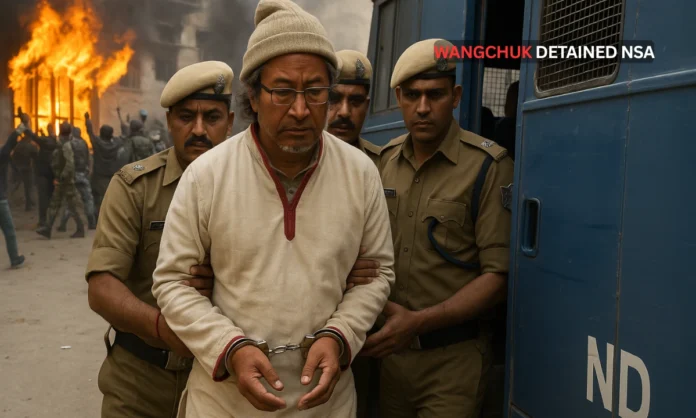Key Highlights:
- Climate activist held at high-security Jodhpur Central Jail under National Security Act provisions allowing 12-month detention without trial
- Four protesters killed and 80 injured during September 24 violence in Leh demanding statehood and Sixth Schedule protections
- Government revokes FCRA license while imposing curfew and internet suspension following Sonam Wangchuk’s detention
Opening Overview
The arrest and subsequent transfer of renowned climate activist Sonam Wangchuk to Jodhpur Central Jail under the National Security Act represents a dramatic escalation in Ladakh’s ongoing constitutional crisis, as violent protests demanding statehood have exposed fundamental governance failures in India’s strategically crucial Himalayan region. Sonam Wangchuk’s detention, implemented on September 26, 2025, came two days after Generation Z-led demonstrations turned deadly in Leh, resulting in four confirmed deaths and over 80 injuries when protesters clashed with security forces and set fire to government buildings.
🚨 Explosive revelation from Ladakh!
— Amit Malviya (@amitmalviya) September 27, 2025
DGP Dr. S.D. Singh Jamwal confirms that Ladakh Police recently arrested a Pakistan Intelligence Operative (PIO) who was in touch with Sonam Wangchuk and passing details to Pakistan. The police have records of this. Wangchuk also attended a… pic.twitter.com/swVV03JIAi
The circumstances surrounding Sonam Wangchuk’s detention trace to his leadership of a 35-day hunger strike that began September 10, demanding Ladakh’s inclusion under the Constitution’s Sixth Schedule and full statehood for the Union Territory. The government’s decision regarding Sonam Wangchuk’s detention followed allegations that his “provocative speeches” and references to “Arab Spring-style protests” incited violence, though the Ramon Magsaysay Award winner has consistently advocated peaceful demonstration methods throughout his activism.

Timeline of escalating events leading to Sonam Wangchuk’s detention under National Security Act
Legal Framework Behind NSA Detention
The National Security Act provisions governing Sonam Wangchuk’s detention empower central and state governments to hold individuals for up to 12 months without trial when their activities are deemed prejudicial to national security, public order, or essential services. Under Section 3 of the NSA, authorities can order Sonam Wangchuk’s detention based on subjective satisfaction that his activities threaten India’s defense, foreign relations, or state security.
The procedural safeguards surrounding Sonam Wangchuk’s detention require authorities to inform him of specific charges within five days, though an Advisory Board comprising three High Court-qualified judges must review his case within three weeks of detention. The legal framework allows Sonam Wangchuk’s detention to continue for initial periods of 12 months each, with government approval required for extensions based on Advisory Board recommendations.
Supreme Court precedents regarding NSA cases emphasize that preventive detention must be justified with proper procedural safeguards, while detained individuals retain the right to challenge their confinement through habeas corpus petitions in High Courts. The Ladakh administration justified Sonam Wangchuk’s detention by claiming he was “indulging in activities prejudicial to security of the State” and that maintaining him in Leh posed risks to public order.
High-Security Confinement Details
Following his arrest, Sonam Wangchuk’s detention facility placement at Jodhpur Central Jail includes high-security arrangements with round-the-clock surveillance and continuous CCTV monitoring in a separate ward from other prisoners. The medical examination conducted upon arrival confirmed his physical condition, while security protocols surrounding Sonam Wangchuk’s detention mirror those applied to high-profile detainees including self-proclaimed godman Asaram Bapu, who remains housed in the same facility.
The strategic location choice for Sonam Wangchuk’s detention approximately 1,000 kilometers from Ladakh effectively isolates him from his support base while ensuring authorities maintain complete control over his communications and visitors. Government sources indicated that Sonam Wangchuk’s detention outside Ladakh was deemed necessary to prevent further unrest and maintain public order in the sensitive border region.
Mobile internet services remain suspended in Leh following Sonam Wangchuk’s detention, while curfew restrictions continue for the fourth consecutive day as authorities work to prevent renewed violence. The comprehensive security response demonstrates government concerns that Sonam Wangchuk’s detention could trigger additional protests in the already volatile region.
Violent Protests and Casualties
The deadly violence preceding Sonam Wangchuk’s detention began September 24 when peaceful demonstrations demanding statehood and Sixth Schedule inclusion escalated into confrontations with security forces in Leh. Official casualty figures confirm four protesters died from police gunfire while 80 others sustained injuries, including 40 police personnel, making this the bloodiest unrest in Ladakh for years.
Protesters set fire to the ruling Bharatiya Janata Party’s local office, the chief executive councilor’s building, and a police vehicle before authorities deployed tear gas and baton charges to disperse crowds. Human Rights Watch documented the violence, calling for restraint and impartial investigation into the excessive force that preceded Sonam Wangchuk’s detention.
The youth-led nature of the protests reflects broader frustration with poor governance, unemployment, and unfulfilled promises that have characterized Ladakh since its separation from Jammu and Kashmir in 2019. At least 50 people were detained during the violence, though most remain in local custody unlike Sonam Wangchuk’s detention in distant Rajasthan.
| Violence Statistics | September 24, 2025 |
|---|---|
| Deaths Confirmed | 4 protesters |
| Total Injured | 80+ individuals |
| Police Casualties | 40 personnel |
| Buildings Torched | 3 government offices |
| Initial Detentions | 50+ individuals |
Government Crackdown Intensifies
The comprehensive government response extends beyond Sonam Wangchuk’s detention to include revoking his NGO’s Foreign Contribution Regulation Act license, citing violations including unauthorized fund deposits and acceptance of foreign contributions for sovereignty-related studies. The Students Educational and Cultural Movement of Ladakh allegedly deposited ₹3.5 lakh into FCRA accounts in violation of regulations during 2021-22, while receiving ₹4.93 lakh from Swedish donors for educational programs.
The Central Bureau of Investigation has initiated probes into another institute associated with the activist, demonstrating the coordinated nature of government scrutiny that culminated in Sonam Wangchuk’s detention. The timing of FCRA cancellation immediately before his arrest suggests systematic efforts to weaken his legal and financial support networks.
Political opposition parties have condemned Sonam Wangchuk’s detention, with Aam Aadmi Party organizing candlelight vigils at Jantar Mantar while party leaders accused the government of compromising border security by targeting patriots who have consistently opposed Chinese aggression. Jammu and Kashmir Chief Minister Omar Abdullah termed Sonam Wangchuk’s detention “unfortunate” and predicted such harsh measures against peaceful activists.
Constitutional Demands and Regional Autonomy
The core issues driving protests that led to Sonam Wangchuk’s detention center on Ladakh’s inclusion under the Constitution’s Sixth Schedule and full statehood, protections that would provide constitutional safeguards for the region’s 97% tribal population and their traditional land rights. The Sixth Schedule provisions would establish Autonomous District Councils with legislative authority over land, forests, water resources, and customary laws currently denied under existing governance structures.
Constitutional experts note that the grievances underlying Sonam Wangchuk’s detention reflect broader tensions between centralized governance and regional autonomy demands, with Sixth Schedule inclusion potentially restricting non-domicile land purchases and protecting Ladakh’s fragile ecosystem from unchecked development. The National Commission for Scheduled Tribes previously recommended Ladakh’s Sixth Schedule inclusion, recognizing distinct cultural heritage of communities including Balti, Beda, Bot, Brokpa, and others.
Current governance under Article 240 regulations provides limited autonomy that can be revoked unilaterally by the central government, unlike constitutionally protected Sixth Schedule provisions that activists argue are essential for long-term stability. Recent government measures including domicile-based job reservations and local language recognition fall short of comprehensive autonomy that demonstrators seek.
Strategic Implications and Future Outlook
Sonam Wangchuk’s detention carries significant implications for India’s border security strategy, given Ladakh’s sensitive location bordering both China and Pakistan in areas of ongoing territorial disputes where the 2020 Galwan clash killed at least 20 Indian soldiers. The harsh response exemplified by his arrest under NSA risks further alienating the local population and undermining long-term stability in this strategically crucial region.
International observers have noted parallels between the circumstances of Sonam Wangchuk’s detention and other recent youth-led protest movements across Asia, highlighting growing frustration with poor governance and empty promises from governments. The resolution of issues surrounding his case will likely determine whether Ladakh achieves sustainable development and political stability or faces continued unrest compromising India’s strategic interests.
The precedent set by using NSA against peaceful activists raises concerns about democratic space and civil liberties in sensitive regions, with implications extending beyond Ladakh to other tribal areas seeking constitutional protections. Human rights organizations continue monitoring the situation while calling for dialogue rather than security crackdowns to address legitimate grievances.
Closing Assessment
Sonam Wangchuk’s detention under the National Security Act represents a critical turning point in Ladakh’s struggle for constitutional recognition, transforming a renowned environmental advocate into a symbol of resistance against perceived governmental overreach in India’s sensitive border regions. The confluence of deadly violence, harsh security responses, and suspended democratic processes has created a volatile situation demanding immediate policy intervention rather than continued crackdowns.
As internet services remain suspended and curfews continue following Sonam Wangchuk’s detention, the fundamental questions raised extend beyond regional boundaries to challenge India’s approach to tribal rights, federal autonomy, and democratic governance in strategically vital areas. The coming weeks will determine whether constitutional dialogue can restore peace or whether the current confrontational trajectory will further destabilize this crucial Himalayan territory.


